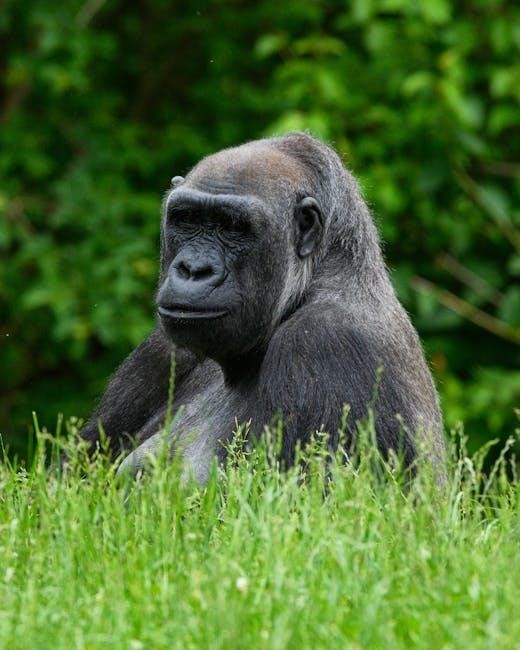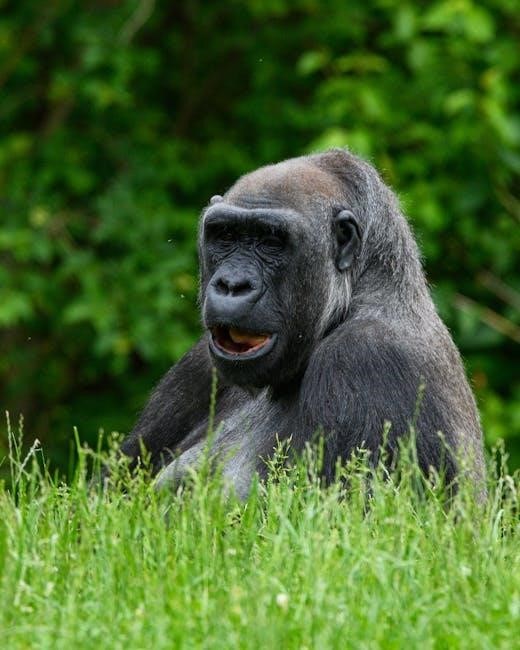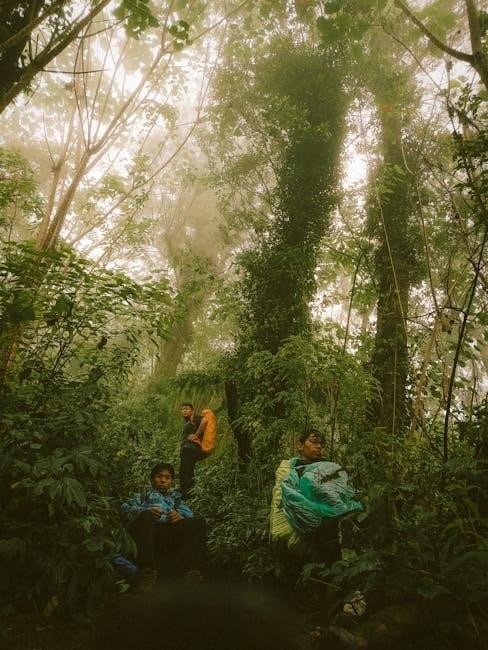
the jungle by upton sinclair pdf
The Jungle by Upton Sinclair is a groundbreaking novel exposing the harsh realities of immigrant life and labor exploitation in early 20th-century America, available as a free PDF.
1.1 Historical Context of “The Jungle”
The Jungle by Upton Sinclair is set against the backdrop of late 19th- and early 20th-century America, a period marked by mass immigration and industrialization. Sinclair, a socialist, aimed to expose the harsh realities faced by immigrants in Chicago’s meatpacking industry. The novel reflects the struggles of workers exploited by capitalist systems and the lack of social support. Published in 1906, it became a catalyst for social change, highlighting the dire need for labor reforms and improved working conditions during the Progressive Era.
1.2 Publication and Initial Impact
The Jungle was published in 1906 and immediately sparked widespread controversy and public outrage. Sinclair’s vivid depiction of the meatpacking industry’s horrors led to a national outcry, prompting President Theodore Roosevelt to launch an investigation. The book became a bestseller, not only in the U.S. but internationally, and is credited with accelerating the passage of the 1906 Meat Inspection Act. Its exposure of worker exploitation and unsanitary conditions resonated deeply, marking a turning point in labor rights and food safety reforms, driven by Sinclair’s socialist ideals and investigative journalism.

Plot Summary
The Jungle follows Jurgis Rudkus, a Lithuanian immigrant, through his harrowing journey in Chicago’s meatpacking industry, exposing its brutal conditions and the devastating impact on his family.
2.1 Main Events and Character Development
The Jungle begins with Jurgis Rudkus, a young Lithuanian immigrant, arriving in Chicago with his family, filled with hope for a better life. The story unfolds as Jurgis secures a grueling job in the city’s meatpacking industry, while his family struggles to adapt. The novel traces their descent into poverty and despair, with key events including Ona’s forced labor, Jurgis’s crippling injury, and Marija’s tragic fall into prostitution. These hardships shape Jurgis’s transformation from an optimistic laborer to a disillusioned survivor, ultimately leading to his departure from the family.
2.2 The Struggles of the Immigrant Family
The Rudkus family faces immense struggles in their pursuit of the American Dream. Economic hardship, unstable employment, and unsanitary living conditions plague their daily lives. Jurgis’s physical labor in the meatpacking plants takes a toll on his health, while Ona and Marija endure exploitation and exhaustion in their respective roles. Their limited English and lack of social support exacerbate their challenges, leading to a cycle of poverty and despair. The family’s resilience is tested as they confront the harsh realities of their new life in America.
Major Themes
The Jungle explores the immigrant experience, highlighting struggles of poverty, exploitation, and the harsh realities of industrial labor, while critiquing capitalism’s dehumanizing effects on workers.
3.1 The Immigrant Experience in America
The Jungle vividly portrays the challenges faced by immigrants in America during the early 20th century, focusing on their struggle to adapt and survive in a hostile environment. The novel highlights the exploitation they endure in the workforce, the lack of social support, and the harsh living conditions. Through the lives of characters like Jurgis and Marija, Sinclair illustrates the resilience and despair of immigrants seeking a better life, often met with disillusionment and hardship. The PDF edition captures these themes in detail.
3.2 Critique of Capitalism and Exploitation
The Jungle is a scathing critique of capitalism, exposing the exploitation of workers in the meatpacking industry. Sinclair reveals how corporations prioritize profits over human welfare, leading to deplorable working conditions and the dehumanization of laborers. The novel portrays the systemic oppression of the working class, emphasizing the lack of rights and protections for workers. The PDF edition underscores Sinclair’s socialist views, highlighting the need for reform to address the injustices perpetuated by capitalist systems. This critique remains a powerful commentary on economic inequality.
Character Analysis
The Jungle delves into the lives of Jurgis, Marija, and Jonas, portraying their struggles and resilience. Each character symbolizes the broader immigrant experience and societal oppression, highlighting Sinclair’s vivid portrayal of human endurance and tragedy through their journeys in a harsh, unforgiving environment.
4.1 Jurgis Rudkus: The Protagonist’s Journey

Jurgis Rudkus, the protagonist of The Jungle, embodies the resilience and despair of an immigrant worker. His journey begins with hope for a better life in America but quickly turns to despair as he faces exploitation, poverty, and personal tragedy. Working in the brutal meatpacking industry, Jurgis witnesses the dehumanizing effects of capitalism. His transformation from an optimistic laborer to a disillusioned socialist highlights Sinclair’s critique of industrial exploitation and the struggle for workers’ rights, making Jurgis a powerful symbol of the immigrant experience in early 20th-century America.
4.2 Marija Berczynskas: A Symbol of Resilience
Marija Berczynskas is a formidable figure in The Jungle, representing the resilience and strength of immigrant women. Working tirelessly in the canning factory, she endures physical and emotional strain to support her family. Despite her efforts, Marija faces exploitation and personal struggles, including her descent into alcoholism. Her character illustrates the sacrifices and hardships faced by women in the workforce, making her a poignant symbol of resilience and the human cost of industrial exploitation in early 20th-century America.
4.3 Jonas Berczynskas: Tragedy and Sacrifice
Jonas Berczynskas, the father-in-law of Jurgis Rudkus, embodies the tragic fate of many immigrants in The Jungle. A kind and hardworking man, Jonas struggles to survive the brutal conditions of the meatpacking industry. His death, caused by the harsh realities of poverty and exploitation, deeply impacts Jurgis and the family; Jonas’s story serves as a poignant reminder of the sacrifices made by immigrants seeking a better life, only to be crushed by the unforgiving capitalist system they endure in America.
Social and Political Commentary

The Jungle serves as a scathing critique of capitalism, exposing the exploitation of workers in the meatpacking industry and advocating for labor reforms through its vivid portrayal of societal injustices. Available as a free PDF, Sinclair’s work remains a powerful commentary on the struggles of the working class and the need for systemic change.
5.1 Exposure of the Meatpacking Industry
The Jungle shockingly revealed the horrific conditions within Chicago’s meatpacking factories, detailing unsanitary practices, worker exploitation, and the use of diseased animals. Sinclair’s graphic descriptions of filthy environments and unsafe labor practices sparked widespread public outrage. The novel exposed how profit-driven companies prioritized efficiency over worker safety and consumer health, leading to a national scandal. These revelations, now accessible in PDF format, remain a powerful critique of industrial exploitation and its human cost, emphasizing the need for accountability and reform.
5.2 Labor Rights and Worker Exploitation
The Jungle vividly portrays the appalling labor conditions faced by immigrant workers in Chicago’s meatpacking industry. Sinclair highlights the long hours, low wages, and lack of safety measures, which led to frequent injuries and illnesses. Workers were exploited mercilessly, with no social support or protections. The novel underscores the human cost of industrial capitalism, where profit prioritized over workers’ well-being. Sinclair’s depiction of these injustices, now accessible in PDF format, remains a powerful critique of labor exploitation and a call for systemic change. Its impact endures as a testament to the struggle for workers’ rights.
5.3 Influence of Sinclair’s Socialist Beliefs
Upton Sinclair’s socialist beliefs deeply shaped The Jungle, as he aimed to expose capitalism’s flaws and advocate for workers’ rights. The novel reflects his conviction that systemic change was needed to address exploitation. Sinclair hoped to inspire a socialist movement by highlighting the injustices faced by immigrants in the meatpacking industry. His critique of capitalism and emphasis on collective action resonate throughout the story, making it a powerful tool for social commentary. The novel’s impact, now accessible in PDF, underscores Sinclair’s enduring influence on labor rights and socialist thought.

Public Reaction and Reforms
The Jungle sparked widespread outrage, prompting media investigations and public demands for change. It led to the passage of the Meat Inspection Act and improved labor regulations. The PDF version highlights these reforms, showcasing Sinclair’s impact on societal change.
6.1 Public Outrage and Media Response
The publication of The Jungle ignited intense public outrage and media scrutiny. The graphic depiction of the meatpacking industry’s horrors shocked readers, leading to widespread demand for accountability. Newspapers nationwide covered the scandal, amplifying Sinclair’s exposé. The public’s emotional response pressured politicians to act, resulting in federal investigations and eventual reforms. The PDF edition of the novel includes historical context about the media frenzy and its role in driving societal change, highlighting Sinclair’s impactful storytelling and its real-world consequences.
6.2 Legislative Changes and Meat Inspection Act

The Jungle directly influenced significant legislative reforms. The public outcry led President Theodore Roosevelt to commission an investigation, confirming Sinclair’s revelations. This prompted the passage of the Meat Inspection Act of 1906, mandating federal oversight of meatpacking plants. The PDF version of the novel outlines these reforms, showcasing how Sinclair’s work drove policy changes and improved food safety standards. His muckraking efforts remain a landmark in American history, demonstrating the power of literature to inspire societal change and protect consumer health.

Availability in PDF Format
The Jungle is widely available in PDF format, free to download from platforms like Project Gutenberg and many online archives, ensuring easy access to this classic novel.
7.1 Sources for Download

The PDF version of The Jungle is available for free download from reputable sources like Project Gutenberg and the Electronic Classics Series by Pennsylvania State University. Additionally, platforms such as Google Books and the Internet Archive offer downloadable versions, ensuring easy access to this classic novel. These sources provide high-quality, free-of-cost downloads, making Sinclair’s groundbreaking work accessible to readers worldwide. The PDF format allows readers to enjoy the book on various devices, preserving its original content and historical significance.
7.2 Features of the PDF Edition
The PDF edition of The Jungle offers a convenient and accessible reading experience. It is available in the public domain, ensuring free access to readers worldwide. The PDF format preserves the original text’s integrity, with clear formatting and searchable content. Readers can easily navigate through the novel’s chapters and sections. Additionally, the PDF is compatible with various devices, including smartphones, tablets, and e-readers. This edition maintains the book’s historical context while providing modern readability, making it an ideal choice for both casual readers and scholars alike.
The Jungle remains a powerful critique of industrial exploitation, with its PDF edition ensuring timeless accessibility to Sinclair’s groundbreaking expose on labor and social injustice.

8.1 Legacy of “The Jungle”
The Jungle by Upton Sinclair left an indelible mark on American literature and society. Its vivid portrayal of labor exploitation and harsh immigrant conditions sparked significant reforms, including the Meat Inspection Act. As a PDF, the novel remains widely accessible, ensuring its powerful message endures. Sinclair’s work not only exposed the meatpacking industry’s horrors but also championed socialist ideals, solidifying its place as a cornerstone of muckraking journalism and a testament to the fight for workers’ rights and social justice.
8.2 Continued Relevance in Modern Society
Despite being written over a century ago, The Jungle remains relevant today, offering insights into ongoing struggles with labor rights, immigration, and social inequality. Its themes of exploitation and systemic injustice resonate with modern issues like wage disparities and workplace safety. The novel’s accessibility in PDF format ensures its message reaches new generations, highlighting the enduring need for advocacy and reform. Sinclair’s work continues to inspire conversations about workers’ rights and the immigrant experience, proving its timeless significance in addressing societal challenges.